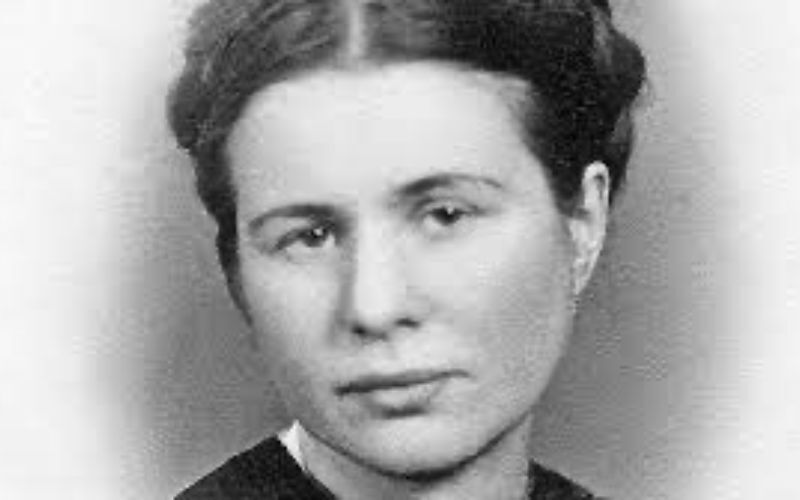Lorna Johnston

by Andre Hueber for the The Aucklander
Almost 70 years ago Lorna Johnston's life was hell ... as a prisoner of war in Yokohoma, Japan, surviving on eating the glue off envelopes. The 96-year-old Kohimarama resident is the only survivor of a group of 76 Australian POW nurses and is returning to Japan, the country that caused her so much pain, this time for an official apology.
Far from being anxious about the experience, spritely Lorna is looking forward to it.
"I'm going to enjoy it," she says. "I'm not carrying any baggage - I've put it behind me. They're going to so much trouble to be friends, I think we should reciprocate and make peace."
She'll be flying business class and staying in top-notch hotels, a far cry from the filthy, deprived conditions she encountered on her last sojourn.
Lorna was born in Hay, New South Wales, and trained as a nurse before joining the army in 1941. She was one of six nurses chosen to go to the island of New Britain in New Guinea, a "front door" to Australia - now part of Papua New Guinea.
The women arrived at the capital, Rabaul, in April 1941 and spent a year at a military hospital treating soldiers suffering from tropical diseases before the Japanese began dropping bombs.
"All of a sudden they were on top of us. The Australians were taken by surprise."
It didn't take long before the first wounded soldiers were brought in for treatment - many requiring amputations.
"It was traumatic, we didn't have time to think, it was all automatic."
The military nurses were joined by seven civilian nurses before being moved with their patients to the Australian-run Catholic Mission in Vunapope, formerly owned by Germans. It was no safe haven.
"Japanese soldiers came in with guns and bayonets, flipped the boys out of their beds and pushed us around. While they had their machine guns trained on us the bishop told them the place was actually a German mission. They swallowed it and let us go."
The bishop, Polish-born Leo Scharmach, considered the soldiers with them a liability so sent them back to Rabaul, leaving the nurses alone for five months.
"There was no contact from the outside world ... no newspapers, books or letters. Our families thought we were dead."
A Japanese military chief came to the mission one day to tell the women they were being taken to the "land of full and plenty".
"He said there's no mosquitoes there and you will be well looked after. We thought we were going [back] to Australia - but we were taken with 70 Australian officers in the hold of a ship to Japan."
Imprisoned in Yokohama
The nurses were imprisoned at the Yokohama Boat Club for 18 months from July 1942, and forced to knit silk bags and make envelopes.
"In the first year the food was awful but sufficient, in the second year it got worse - in the end it was non-existent."
The women fashioned clothes for themselves with used canvas sails and bamboo needles and ended up eating the glue on envelopes.
"We were doing fewer and fewer envelopes and eating more and more glue. They said we were wasting it. They didn't realise we were eating it."
Lorna recalls telling the cook, Fuji San, they needed more food to eat.
"He'd say: 'More? Better you die'."
"I remember watching him cut up cabbage for the guards. He'd cut it in half and throw the core in the rubbish. We'd grab it and put it under our arms.
He'd notice straight away and say: 'Where gone?, You take?' In the end he threw them out the window and we'd retrieve them at night."
Lorna says Fuji San had also been selling the nurse's rice rations to his family. The soldiers were later replaced by two policemen withdrawn from the army because they had tuberculosis.
"They used to cough all the time. We'd take trays into the the room, bow and put them down. When we collected them later, if there was any food left, we'd eat it. Three girls ended up with TB."
She says Fuji San showed a nicer side at one point when he lent the women a small heater.
"But one of the guards came in and saw it and threw it into the sea. Fuji San was furious. Then we were made to stand in a line for two hours while the guard went up and down slapping our faces and waving his sword around."
Lorna describes the policemen as "utter lunatics". "We called them Cougher and Basher."
The women were hit across the back and punched, but were not raped.
"We weren't their type," she says. "They never broke our spirit. We always had hope and knew we'd get out one day."
At one point, she remembers looking through a hole in the palisade and seeing a ship in the harbour with a white cross on it.
"We were positive we were going to be exchanged - but they took us on a truck in the other direction - towards Mount Fuji. There were so many disappointments. They came and they went."
The nurses were taken to a former TB clinic on a hill at Totsuka to dig stumps and sweep snow. They survived in sub-zero temperatures with no running water and only two futons each.
"We had them for three years and they never saw a washing machine. We were working in fields with human manure and our duvets could have stood up they were so stiff with dirt."
They knitted jumpers for children and told the Japanese mothers each would take six balls of wool when they knew it would take only four.
"We lived by our wits."
One day the guards ordered the women to walk down the hill.
"We thought those bastards want us to lift stuff up the hill. We were in a weakened state. They marched us down, our feet wrapped in rags."
But a pleasant surprise awaited them in the form of a a Red Cross parcel, with tea, cocoa, butter and cigarettes. They were careful to make it last. "We added half a spoon of sugar and half a spoon of powdered milk to our bowl of rice. It made such a difference, it was like heaven."
Firebombing of Tokyo
Lorna has vivid memories of the fire-bombing of Tokyo, which killed 100,000 people in March 1945 - more than the 70,000 killed by the atomic bomb in Hiroshima in August the same year.
"We sat on the windowsills and watched. The sound of sirens went on for half an hour before more than 1000 bombers flew across in waves. It was like daylight, there was so much light in the sky. It was one of the worst things anyone could see."
The Japanese weren't prepared for the bombing and didn't have underground shelters. "Women were running in the streets with babies burning on their backs and thousands ran into the river - it was packed with bodies floating out to sea."
Corpses were stacked on top of each other in graveyards and family members laid rice balls on them to give to their spirits. The nurses crept in at night and ate the rice balls, despite the putrid smell.
"We tried to get to them before the rabbits. We decided the spirits that are alive deserve them more."
They overheard the Japanese Emperor's surrender speech on the radio but it wasn't until American soldiers visited them that they knew the war was over.
"We'd never seen Americans before. We didn't know who they were, we'd never seen Jeeps."
The emaciated women celebrated by eating a large lump of meat ... but their digestive systems were so damaged it caused diarrhoea.
They were flown to Manila for a month, fed, tested and detoxed, before returning to Australia on September 25, 1945.
"We had lots to learn. We were out of the world for four years and coming back to a strange place."
Lorna's mother had died while she was away and her family home had been removed. "It was a wonderful time, but it was very hard."
In 1947 the Australian Government recognised her with a Mention In Dispatches Award (MID) for holding the hospital at Vunapope together.
Arrival in New Zealand
By 1948 she decided she wanted to experience the world, so planned a trip to the US with a friend. They stopped in New Zealand, and Lorna never left.
She stayed at a private nurses' home in Auckland but fell ill and spent six months in hospital. Her body became stiff and she couldn't move, so her legs were put in splints. Doctors thought she had polio, but healthy doses of sunlight and fresh air helped her make a full recovery.
Once she was well, she married Bill, a Kiwi, who served in the New Zealand 18th battalion. He died in 1980.
In 1992 Lorna was awarded a Queen's Service Order medal for 14 years of work with physically handicapped children at Mt Roskill school. Last year, her story, and that of another Australian nurse, were made into a telemovie, Sisters of War, based on Rod Miller's transcript, The Lost Women of Rabaul. Lorna makes a guest appearance at the end of the film.
Then, this year, Lorna was nominated to take part in a Japanese-organised prisoners-of-war programme, one of five POWs invited. She left on the 10-day trip last Sunday, with her daughter Patricia, and will meet Government leaders and visit places of special significance.
Hardly will Lorna's feet have touched the ground when she returns home to Auckland, when she'll be visited by Australian artist Peter Wegner who'll be painting her portrait. It will be hung in Melbourne's Shrine of Remembrance as part of an exhibition on the entry of the Japanese into World War II. Despite an apology coming so late, the amazingly gracious and eloquent Lorna shows not a shred of bitterness.
"The Japanese people themselves are not cruel. It's the culture in their army that forms hatred."

